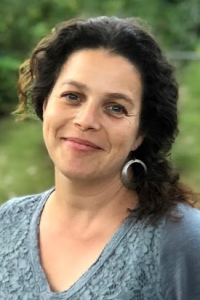
Ph.D.
Associate Professor
School of Natural Resources
Research at a glance
Area(s) of Expertise
Research Summary
I'm a freshwater ecologist focused on understanding how human activities impact water quality and the functioning of aquatic ecosystems. I'm particularly interested in how matter and energy move within these ecosystems and connect to the surrounding landscape. To investigate these dynamics, I integrate principles from hydrology and ecology and use a combination of methods, including experimental manipulations, observational studies, and modeling. My work contributes to our knowledge of how human actions influence aquatic ecosystems and informs strategies for their protection and management.
My research encompasses the following key areas:
1. Nutrient Dynamics and Biogeochemical Processes in Streams: Excess nutrient loading is a major cause of freshwater ecosystem impairment. My research delves into understanding the factors controlling nutrient transport and transformation in streams throughout the year. We have developed innovative techniques, such as a smart tracer using fluorescent dye, to study water exchange between the stream channel and the hyporheic zone, shedding light on how this exchange influences water quality and ecosystem function.
2. Stream metabolism: Stream metabolism involves the balance between organic matter production and consumption in stream ecosystems, impacting nutrient cycling and carbon dioxide emissions, which our research indicates could increase in a warmer climate, potentially turning streams into greenhouse gas sources rather than sinks, with global climate implications. We’ve also developed a model to understand the contributions of different organic matter sources to ecosystem respiration, shedding light on the reactivity of various organic matter stocks in streams, and introduced a simplified method for measuring gas exchange, vital for estimating ecosystem respiration and productivity in low-primary-productivity streams.
3. Long-Term Data for Science-Based Management: I recognize the significance of long-term, uninterrupted monitoring to fully comprehend ecological processes and patterns of change. I lead the Lakes of Missouri Volunteer Program, a community-based initiative that dates back to 1992. This program enlists nearly 200 dedicated citizen scientists who collect water samples from Missouri’s waterbodies annually. The dataset generated through this program, which includes the analysis of 17 parameters, is a primary resource used by the Missouri Department of Natural Resources and the US Environmental Protection Agency to assess and manage changes in the water quality of Missouri’s waterbodies. Additionally, my involvement in the Long-Term Ecological Research Network (LTER) and the HJ Andrews Experimental Forest LTER site and the Trask Watershed Study has allowed me to contribute to studies that unveil unexpected variability in nutrient concentrations and challenge the paired watershed approach often used in hydrology studies.
4. Impacts of Global Change on Aquatic Biogeochemistry: Global changes, such as land use alterations and increasing temperatures, affect the ability of streams to process matter and energy, ultimately impacting nutrient loading and greenhouse gas emissions. My research synthesizes data to demonstrate changes in dissolved organic matter stoichiometry and explores the effects of nitrogen speciation on dissolved organic matter. We’ve also identified the substantial contribution of small headwater streams to the global carbon budget.
5. Urban Stream Ecology: The growth of urban areas has a disproportionate impact on water quality and stream habitat. I’ve been actively involved in characterizing the water quality of urban streams, particularly the legacy effects of mining activities. Our research has shown how mine discharges alter nutrient cycling and influence microbial communities in these environments.
6. Nature-Based Solutions for Water Quality Improvement: My group’s work has demonstrated the effectiveness of nature-based solutions in reducing nutrient pollution in aquatic ecosystems. We’ve examined the role of macrophytes in controlling nitrogen and phosphorus concentrations in streams. This research has revealed species-specific variations in water quality improvement provided by macrophytes, depending on root architecture and evapotranspiration rates.
Educational background
- Ph.D. University of Barcelona (Spain)
Courses taught
- Watershed Management and Water Quality
- Stream Ecology
- Methods in Stream Ecology
- Water Resources Graduate Seminar
- Protection and Management of Tropical Ecosystems- Study Abroad
- Journal Club in Water Resources